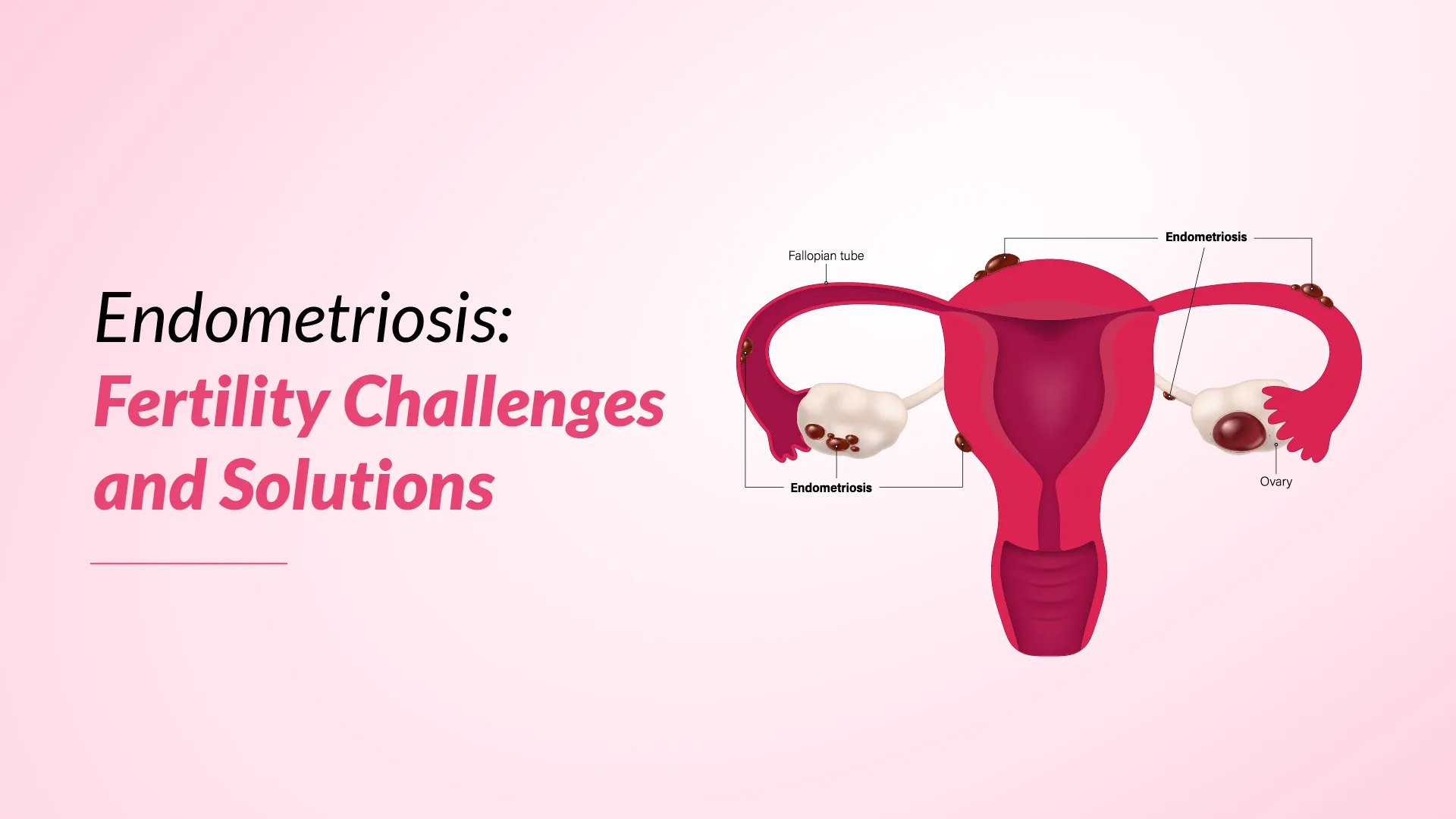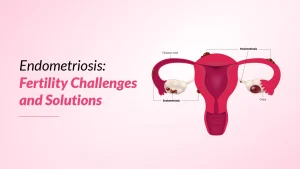Many women wonder if they can get pregnant with endometriosis, a condition that affects roughly 1 in 10 women of reproductive age. While endometriosis can make conception more challenging, it doesn’t always mean pregnancy is impossible.
This comprehensive guide explores the connection between endometriosis and fertility, available treatment options, and ways to improve pregnancy chances. Whether considering natural conception or assisted reproductive technologies, understanding these aspects helps make informed decisions about fertility care.
What is Endometriosis?
Endometriosis is a chronic gynaecological condition. In this condition, the tissue similar to the uterine lining grows outside the uterus. This tissue, known as endometrial-like tissue, can develop on various other organs, including the ovaries, fallopian tubes, and surrounding pelvic structures.
The condition uniquely affects the reproductive system. During each menstrual cycle, this misplaced tissue reacts to hormonal changes like the uterine lining. It gets thickened, breaks down, and attempts to shed. However, unlike normal menstrual tissue, this displaced tissue cannot exit the body, leading to inflammation and scarring.
Common symptoms of endometriosis include:
- Severe menstrual cramps: Often more intense than typical period pain
- Chronic pelvic pain: Persistent discomfort in the pelvic region
- Pain during intercourse: Discomfort or pain during intimate moments
- Heavy or irregular periods: Changes in menstrual flow patterns
- Painful bowel movements: Particularly during menstruation
- Fatigue: Chronic exhaustion affecting daily activities
- Bloating: Abdominal distension and discomfort
The relationship between endometriosis & fertility is complex, affecting approximately 30-50% of women who struggle with fertility issues. This condition can impact various aspects of reproduction, from egg quality to implantation success, making it a big concern for those planning to conceive.
How Endometriosis Affects Fertility
The impact of endometriosis on fertility extends far beyond simple reproductive challenges. Understanding these mechanisms helps couples prepare for their fertility journey.
Impact on Ovulation
Endometriosis can disrupt normal ovulation patterns by creating inflammation around the ovaries. This inflammation may prevent the regular release of eggs, making it harder to time conception accurately.
Influence on Egg Reserve
Women with endometriosis often experience a rapid decline in the ovarian reserve. The condition can affect both the quantity and quality of eggs available for conception.
Key fertility impacts include:
- Reduced egg quality: Due to chronic inflammation affecting cellular health
- Compromised ovarian function: Affecting hormone production and egg release
- Altered hormone production: Disrupting the delicate reproductive cycle
- Increased oxidative stress: Damaging reproductive cells and tissues
- Scarring of reproductive tissues: Creating physical barriers to conception
Effects on Fallopian Tubes
Endometriosis can develop adhesions and scarring in the fallopian tubes, making it difficult for eggs to travel and meet sperm. This structural damage represents one of the most significant fertility challenges associated with the condition.
Uterine Environment
The condition also creates an inflammatory environment in the uterus, potentially affecting implantation success. This hostile environment can prevent fertilized embryos from properly attaching to the uterine wall.
Diagnosing Endometriosis
Accurate diagnosis of endometriosis plays a crucial role in determining appropriate fertility treatments. Early detection and intervention can significantly improve pregnancy outcomes.
Imaging Techniques for Diagnosis
Modern imaging technologies help doctors visualise endometrial lesions and assess their impact on reproductive organs. The most common imaging methods include:
- Transvaginal Ultrasound: Provides detailed views of the reproductive organs and can detect endometriomas
- Magnetic Resonance Imaging (MRI): Offers comprehensive imaging of deep endometriosis
- 3D Ultrasound: Helps evaluate the extent of adhesions and their impact on fertility
- Sonohysterography: Examines the uterine cavity for potential barriers to conception
Laparoscopy and Diagnosis
Laparoscopy remains the gold standard for identifying and confirming endometriosis, mainly when fertility issues are present. Surgeons can diagnose and treat endometriosis during this minimally invasive procedure in the same session.
The procedure allows doctors to:
- Visually confirm the presence of endometrial tissue
- Assess the severity and location of lesions
- Remove visible endometriosis deposits
- Evaluate the condition of reproductive organs
This surgical approach provides valuable information about the extent of endometriosis, helping doctors develop targeted treatment plans for women experiencing endometriosis fertility problems.
Treatment Options for Endometriosis and Fertility
Treatment options for endometriosis-related fertility issues have evolved significantly, offering hope to women seeking to conceive. The treatment journey usually includes comprehensive approaches tailored to individual needs.
- Hormonal Medications: Birth control pills or GnRH agonists to control endometriosis growth
- Pain Management: Anti-inflammatory medications to reduce pelvic pain
- Surgical Intervention: Laparoscopic surgery to remove endometrial lesions
- Fertility Treatments: From ovulation induction to assisted reproductive technologies
- Complementary Therapies: Including acupuncture and pelvic physical therapy
The treatment timing can determine success rates. Women planning to conceive should discuss their fertility goals with their doctor, as some treatments may temporarily suppress fertility while managing endometriosis symptoms.
For those actively trying to get pregnant with endometriosis, doctors often recommend a combination of treatments. Surgical removal of endometrial tissue, particularly before fertility treatments, has shown improved pregnancy rates in many cases.
IVF with Endometriosis: What to Expect
In vitro fertilisation (IVF) represents a significant advancement for women with endometriosis who wish to conceive. This assisted reproductive technology offers hope when natural conception proves challenging.
IVF and Endometriosis Success Rates
The success rates for IVF with endometriosis vary depending on several factors, including the woman’s age and the severity of the condition. Research shows that women with endometriosis typically experience success rates between 20-40% per IVF cycle, which may be slightly lower than those without the condition.
Strategies for Improving IVF Outcomes
Doctors recommend several approaches to optimise IVF success:
- Surgical treatment of endometriosis before IVF
- Hormone suppression therapy prior to Embryo transfer
- Careful timing of egg retrieval
- Enhanced embryo selection techniques
- Specialised implantation protocols
The success of IVF treatment often depends on proper preparation and timing. Medical professionals typically recommend a three-month preparation period before starting IVF, during which they focus on reducing inflammation and creating optimal conditions for embryo implantation.
Living with Endometriosis: Lifestyle Changes and Support
Living with endometriosis while trying to conceive requires a holistic approach extending beyond conventional medical treatments.
Diet and Nutrition Considerations
An anti-inflammatory diet plays an elementary role in managing both endometriosis and fertility issues. Doctors recommend:
- Increasing omega-3-rich foods like salmon and walnuts
- Adding antioxidant-rich fruits and vegetables
- Reducing processed foods and refined sugars
- Including iron-rich foods to combat fatigue
- Limiting caffeine and alcohol intake
- Choosing organic products when possible
Emotional Support and Counselling
The journey of managing endometriosis while trying to get pregnant with endometriosis can be emotionally challenging. Professional counselling provides valuable tools for coping with the stress and anxiety that often accompany endometriosis fertility problems.
Support can come from various sources, including fertility counsellors, support groups, and mental health professionals specialising in reproductive health.
Comprehensive Fertility Services
Find Hope and Solutions for Female Infertility and Male Infertility — Explore Our Comprehensive Services
Conclusion
Managing endometriosis while trying to conceive presents unique challenges, but medical advancements and treatment options offer real hope for women facing this condition. Modern fertility treatments, especially IVF, combined with proper lifestyle changes and support systems, significantly improve pregnancy chances for many women with endometriosis.
Success often comes from a comprehensive approach that includes proper medical care, dietary adjustments, and emotional support. Women who understand their condition, work closely with doctors and maintain a positive outlook typically experience better outcomes. Though the journey might take time, many women with endometriosis successfully build their families through careful planning and appropriate medical intervention.
If you’re facing endometriosis and fertility challenges, the experts at Ferty9 Fertility Center are here to support your journey. With personalized treatment plans, advanced reproductive technologies, and compassionate care, we help couples navigate the path to parenthood. Contact Ferty9 Fertility Center today for expert guidance tailored to your unique needs.

























